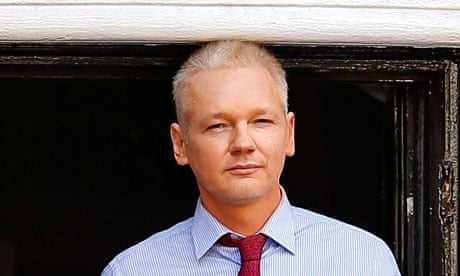WikiLeaks founder Julian Assange's complaint about a More4 documentary he claimed was unfair and violated his privacy has not been upheld by Ofcom, the media regulator.
Ofcom ruled that the More4 documentary, True Stories: WikiLeaks – Secrets and Lies, was fair and did give Assange appropriate opportunity to respond before the programme was aired on 29 November 2011.
The media regulator rejected Assange's complaint that More4 had violated his privacy by showing footage of him dancing in a nightclub in Iceland.
Assange, founder of the whistleblowers' website, has complained about negative media coverage of his legal battle to avoid extradition to Sweden, where he faces sexual assault allegations.
He is currently taking refuge in the Ecuadorian embassy in Knightsbridge, London, in defiance of the extradition order.
The documentary was part of the Channel 4 digital service's True Stories strand and featured contributions from the Guardian's investigations editor, David Leigh, and special correspondent Nick Davies, who worked closely with Assange on the publication of leaked US diplomatic cables from November 2010. The programme also featured interviews with several people who had worked closely with Assange, including a former WikiLeaks employee.
Assange said More4 had not obtained his informed consent to appear in the programme, claiming they had misrepresented to him what the documentary would focus on and he had not been told who else would appear.
However, Ofcom ruled that Assange had provided his informed consent and that his assistant had exchanged emails over several weeks with the programme makers over what it would contain.
The WikiLeaks founder also complained about the use of grainy footage of him dancing in a nightclub in Iceland, which had been taken by a member of the public and then uploaded to the video-sharing website, YouTube.
Ofcom noted that Assange had given permission to the person to film him dancing on the condition it was for this video maker's personal use only.
The regulator ruled: "The footage was filmed in a nightclub, which is a public place, and Mr Assange was not shown engaged in an activity which would reasonably be considered to be private or in circumstances which could normally give rise to a legitimate expectation of privacy.
"Ofcom also took into account that Mr Assange has been in the public eye since the launch of WikiLeaks. Further, the footage had been made available to the public in a number of items on the internet months before the programme was broadcast."
It added: "Accordingly, Ofcom's decision is that Mr Assange's complaints of unjust or unfair treatment and of unwarranted infringement of privacy in the programme as broadcast should not be upheld".
Assange wrote to the Leveson inquiry into press standards in April, claiming he had "suffered extensive libels" comparable to Gerry and Kate McCann, who received significant damages from a number of national newspapers over coverage of the search for their missing daughter Madeleine.
He had previously lost a complaint to the Press Complaints Commission about 45 articles, in publications including the Guardian and the Independent, which he said were inaccurate and unfair.
To contact the MediaGuardian news desk email editor@mediatheguardian.com or phone 020 3353 3857. For all other inquiries please call the main Guardian switchboard on 020 3353 2000. If you are writing a comment for publication, please mark clearly "for publication".
